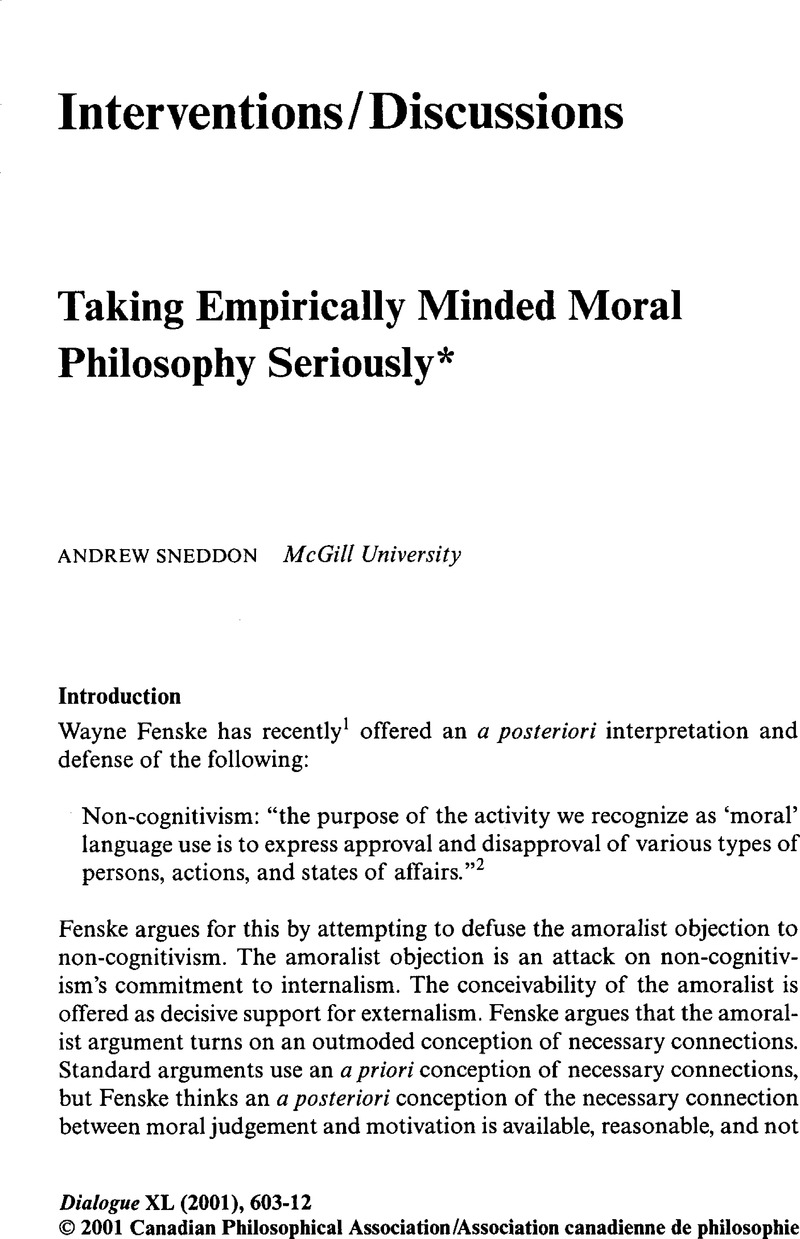Article contents
Taking Empirically Minded Moral Philosophy Seriously*
Published online by Cambridge University Press: 13 April 2010
Abstract

- Type
- Interventions/Discussions
- Information
- Dialogue: Canadian Philosophical Review / Revue canadienne de philosophie , Volume 40 , Issue 3 , Summer 2001 , pp. 603 - 612
- Copyright
- Copyright © Canadian Philosophical Association 2001
References
Notes
1 “The Advantage of an Empirically Minded Conception of Non-Cognitivism,” Dialogue: Canadian Philosophical Review, 39, 3 (Summer 2000): 513–29CrossRefGoogle Scholar.
2 Ibid., p. 523.
3 Ibid. He also speaks of this as “de re internalism.” I shall stick with the term a posteriori.
4 Ibid.
5 Ibid., p. 526.
6 Recognizing a role for moral distinctions in motivation is here suggested as a general constraint on any plausible view of externalism. Denying such a possibility rules out action on the basis of moral thought altogether, which is utterly implausible.
7 Garrett Millikan, Ruth, “Pushmi-Pullyu Representations,” in Mind and Morals: Essays on Cognitive Science and Ethics, edited by May, Larry, Friedman, Marilyn, and Clark, Andy (Cambridge, MA: A Bradford Book-The MIT Press, 1996)Google Scholar.
8 Ibid., p. 146.
9 Ibid., p. 153.
10 Ibid., p. 155.
11 On rationality as a constraint on internalism, see Korsgaard's, Christine “Skepticism about Practical Reason,” in Moral Discourse and Practice: Some Philosophical Approaches, edited by Darwall, Stephen, Gibbard, Allan, and Railton, Peter (Oxford: Oxford University Press, 1997)Google Scholar.
12 With this comes the possibility of a community of immoral or irrational moralists who consistently fail to act on the basis of moral distinctions; instead, they use them merely to classify. This should sound very unlikely (it is), but this does not make it empirically impossible. Yet moral practitioners would have to rule it out as impossible in this way to judge that such people are not taking part in at least one aspect of the activity that characterizes our moral community.
13 Or themselves; it is reasonable to think that self-reports are no better, no more epistemically privileged, than third-person assessments of behaviour. The classic account of empirical evidence for this very important idea is Nisbett, Richard and Ross, Lee, Human Inference: Strategies and Shortcomings of Social Judgment (Englewood Cliffs, NJ: Prentice-Hall, 1980)Google Scholar. We clearly do not know of ourselves, introspectively, whether moral distinctions motivate directly or via independent mental states. If we did have such knowledge, there would be no internalism/externalism debate.
14 Thanks to an anonymous referee from this journal for helpful and challenging comments.
- 1
- Cited by




